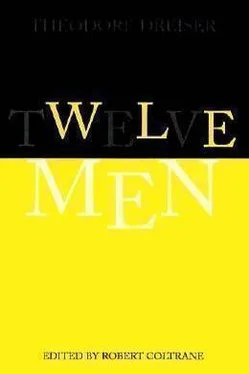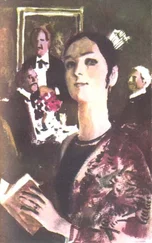Теодор Драйзер - Twelve Men
Здесь есть возможность читать онлайн «Теодор Драйзер - Twelve Men» весь текст электронной книги совершенно бесплатно (целиком полную версию без сокращений). В некоторых случаях можно слушать аудио, скачать через торрент в формате fb2 и присутствует краткое содержание. Год выпуска: 2014, Издательство: epubBooks Classics, Жанр: Биографии и Мемуары, на английском языке. Описание произведения, (предисловие) а так же отзывы посетителей доступны на портале библиотеки ЛибКат.
- Название:Twelve Men
- Автор:
- Издательство:epubBooks Classics
- Жанр:
- Год:2014
- ISBN:нет данных
- Рейтинг книги:4 / 5. Голосов: 1
-
Избранное:Добавить в избранное
- Отзывы:
-
Ваша оценка:
- 80
- 1
- 2
- 3
- 4
- 5
Twelve Men: краткое содержание, описание и аннотация
Предлагаем к чтению аннотацию, описание, краткое содержание или предисловие (зависит от того, что написал сам автор книги «Twelve Men»). Если вы не нашли необходимую информацию о книге — напишите в комментариях, мы постараемся отыскать её.
Twelve Men — читать онлайн бесплатно полную книгу (весь текст) целиком
Ниже представлен текст книги, разбитый по страницам. Система сохранения места последней прочитанной страницы, позволяет с удобством читать онлайн бесплатно книгу «Twelve Men», без необходимости каждый раз заново искать на чём Вы остановились. Поставьте закладку, и сможете в любой момент перейти на страницу, на которой закончили чтение.
Интервал:
Закладка:
"You know how it is when they do this to you. Cry 'Fire!' and you can nearly wreck a perfectly good theater building. Depositors withdraw, securities tumble, investigation and legal expenses begin, your financial associates get frightened or ashamed and desert you. Nothing is so squeamish or so retiring and nervous as money. Time will show that I was not insolvent at the time. The books will show a few technically illegal things, but so would the books or the affairs of any great bank, especially at this time, if quickly examined. I was doing no more than all were doing, but they wanted to get me out—and they did."
Regardless of proceedings of various kinds—legal, technical and the like—X― was finally sent to the penitentiary, and spent some time there. At the same time his confession finally wrecked about nine other eminent men, financiers all. A dispassionate examination of all the evidence eight years later caused me to conclude without hesitation that the man had been a victim of a cold–blooded conspiracy, the object of which was to oust him from opportunities and to forestall him in methods which would certainly have led to enormous wealth. He was apparently in a position and with the brains to do many of the things which the ablest and coldest financiers of his day had been and were doing, and they did not want to be bothered with, would not brook, in short, his approaching rivalry. Like the various usurpers of regal powers in ancient days, they thought it best to kill a possible claimant to the throne in his infancy.
But that youth of his! The long and devious path by which he had come! Among the papers relating to the case and to a time when he could not have been more than eighteen, and when he was beginning his career as a book agent, was a letter written to his mother (August, 1892), which read:
"MY DEAR PARENTS: Please answer me at once if I can have anything of you, or something of you or nothing. Remember this is the first and the last time in my life that I beg of you anything. You have given to the other child not $15 but hundreds, and now when I, the very youngest, ask of you, my parents, $15, are you going to be so hard–hearted as to refuse me? Without these $15 it is left to me to be without income for two or three weeks.
"For God's sake, remember what I ask of you, and send me at once so that I should cease thinking of it. Leon, as I have told you, will give me $10, $15 he has already paid for the contract, and your $15 will make $25. Out of this I need $10 for a ticket and $15 for two or three weeks' board and lodging.
"Please answer at once. Don't wait for a minute, and send me the money or write me one word 'not.' Remember this only that if you refuse me I will have nothing in common with you.
"Your son,
"―"
There was another bit of testimony on the part of one Henry Dom, a baker, who for some strange reason came forward to identify him as some one he had known years before in Williamsburgh, which read:
"I easily recognize them" (X― and his sister) "from their pictures in the newspapers. I worked for X―'s father, who was a baker in Williamsburgh, and frequently addressed letters that were written by X― Senior and his wife to Dr. Louise X― who was then studying medicine in Philadelphia. X― was then a boy going to school, but working in his father's bakery mornings and evenings. He did not want to do that, moaned a great deal, and his parents humored him in his attitude. He was very vain, liked to appear intellectual. They kept saying to their friends that he should have a fine future. Five years later, after I had left them once, I met the mother and she told me that X― was studying banking and getting along fine."
Some seven years after the failure and trial by which he had so summarily been disposed of and after he had been released from prison, I was standing at a certain unimportant street corner in New York waiting for a car when I saw him. He was passing in the opposite direction, not very briskly, and, as I saw, plainly meditatively. He was not so well dressed. The clothes he wore while good were somehow different, lacking in that exquisite something which had characterized him years before. His hat—well, it was a hat, not a Romanoff shako nor a handsome panama such as he had affected in the old days. He looked tired, a little worn and dusty, I thought.
My first impulse was of course to hail him, my second not, since he had not seen me. It might have been embarrassing, and at any rate he might not have even remembered me. But as he walked I thought of the great house by the sea, the studio, the cars, the 40,000 roses, the crowds at his summer place, the receptions in town and out, Madame of the earrings (afterward married to a French nobleman), and then of the letter to his mother as a boy, the broken shoes in the winter time, his denial of his parents, the telephone message from the financial tiger. "Vanity, vanity," saith the preacher. The shores of our social seas are strewn with pathetic wrecks, the whitening bone of half–sand–buried ships.
At the next corner he paused, a little uncertain apparently as to which way to go, then turned to the left and was lost. I have never seen nor heard of him since.
The Mighty Rourke
When I first met him he was laying the foundation for a small dynamo in the engine–room of the repair shop at Spike, and he was most unusually loud in his protestations and demands. He had with him a dozen Italians, all short, swarthy fellows of from twenty–five to fifty years of age, who were busy bringing material from a car that had been pushed in on the side–track next to the building. This was loaded with crushed stone, cement, old boards, wheelbarrows, tools, and the like, all of which were to be used in the labor that he was about to undertake. He himself was standing in the doorway of the shop where the work was to be conducted, coat off, sleeves rolled up, and shouting with true Irish insistence, "Come, Matt! Come, Jimmie! Get the shovels, now! Get the picks! Bring some sand here! Bring some stone! Where's the cement, now? Where's the cement? Jasus Christ! I must have some cement! What arre ye all doin'? What do ye think ye're up here fer? Hurry, now, hurry! Bring the cement!" and then, having concluded this amazing fanfare, calmly turning to gaze about as if he were the only one in the world who had the right to stand still.
More or less oppressed with life myself at the time, I was against all bosses, and particularly against so seemingly a vicious one as this. "What a slave driver!" I thought. "What a brute!" And yet I remember thinking that he was not exactly unpleasant to look at, either—quite the contrary. He was medium in height, thick of body and neck, with short gray hair and mustache, and bright, clear, twinkling Irish gray eyes, and he carried himself with an air of unquestionable authority. It was much as if he had said, "I am the boss here"; and, indeed, he was. Is it this that sends the Irish to rule as captains of hundreds the world over?
The job he was bossing was not very intricate or important, but it was interesting. It consisted of digging a trench ten by twelve feet, and shaping it up with boards into a "form," after which concrete was to be mixed and poured in, and some iron rods set to fasten the engine to—an engine bed, no less. It was not so urgent but that it might have been conducted with far less excitement, but what are you to do when you are naturally excitable, love to make a great noise, and feel that things are going forward whether they are or not? Plainly this particular individual loved noise and a great stir. So eager was he to have done with it, no matter what it was or where, that he was constantly trotting to and fro, shouting, "Come, Matt! Come, Jimmie! Hurry, now, bring the shovels! Bring the picks!" and occasionally bursting forth with a perfect avalanche of orders. "Up with it! Down with it! Front with it! Back with it! In with it! Out with it!" all coupled with his favorite expletive, "Jasus Christ," which was as innocent of evil, I subsequently came to know, as a prayer. In short, he was simply wild Irish, and that was all there was to him—a delightful specimen, like Namgay Doola.
Читать дальшеИнтервал:
Закладка:
Похожие книги на «Twelve Men»
Представляем Вашему вниманию похожие книги на «Twelve Men» списком для выбора. Мы отобрали схожую по названию и смыслу литературу в надежде предоставить читателям больше вариантов отыскать новые, интересные, ещё непрочитанные произведения.
Обсуждение, отзывы о книге «Twelve Men» и просто собственные мнения читателей. Оставьте ваши комментарии, напишите, что Вы думаете о произведении, его смысле или главных героях. Укажите что конкретно понравилось, а что нет, и почему Вы так считаете.









